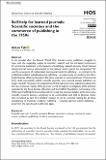Files in this item
Self-help for learned journals : scientific societies and the commerce of publishing in the 1950s
Item metadata
| dc.contributor.author | Fyfe, Aileen | |
| dc.date.accessioned | 2021-03-22T17:30:04Z | |
| dc.date.available | 2021-03-22T17:30:04Z | |
| dc.date.issued | 2022-06 | |
| dc.identifier | 272862667 | |
| dc.identifier | f3ed5c39-ca81-4105-9e7b-3d2474d9e2e2 | |
| dc.identifier | 85102757589 | |
| dc.identifier | 000630797300001 | |
| dc.identifier.citation | Fyfe , A 2022 , ' Self-help for learned journals : scientific societies and the commerce of publishing in the 1950s ' , History of Science , vol. 60 , no. 2 , pp. 255-279 . https://doi.org/10.1177/0073275321999901 | en |
| dc.identifier.issn | 0073-2753 | |
| dc.identifier.other | ORCID: /0000-0002-6794-4140/work/91341144 | |
| dc.identifier.uri | https://hdl.handle.net/10023/21683 | |
| dc.description | The author disclosed receipt of the following financial support for the research, authorship, and/or publication of this article: AHRC grant AH/K001841/1. | en |
| dc.description.abstract | In the decades after the Second World War, learned society publishers struggled to cope with the expanding output of scientific research and the increased involvement of commercial publishers in the business of publishing research journals. Could learned society journals survive economically in the postwar world, against this competition? Or was the emergence of a sales-based commercial model of publishing – in contrast to the traditional model of subsidized journal publishing – an opportunity to transform the often-fragile finances of learned societies? But there was also an existential threat: if commercial firms could successfully publish scientific journals, were learned society publishers no longer needed? This paper investigates how British learned society publishers adjusted to the new economic realities of the postwar world, through an investigation of the activities organized by the Royal Society of London and the Nuffield Foundation, culminating in the 1963 report Self-Help for Learned Journals. It reveals the postwar decades as the time when scientific research became something to be commodified and sold to libraries, rather than circulated as part of a scholarly mission. It will be essential reading for all those campaigning to transition academic publishing – including learned society publishing – away from the sales-based model once again | |
| dc.format.extent | 25 | |
| dc.format.extent | 170097 | |
| dc.language.iso | eng | |
| dc.relation.ispartof | History of Science | en |
| dc.subject | Academic publishing | en |
| dc.subject | Scientific journals | en |
| dc.subject | Twentieth-century Britain | en |
| dc.subject | Commercialization | en |
| dc.subject | Open access | en |
| dc.subject | Scientific societies | en |
| dc.subject | Scholarly communication | en |
| dc.subject | D204 Modern History | en |
| dc.subject | Z665 Library Science. Information Science | en |
| dc.subject | ZA4050 Electronic information resources | en |
| dc.subject | T-NDAS | en |
| dc.subject.lcc | D204 | en |
| dc.subject.lcc | Z665 | en |
| dc.subject.lcc | ZA4050 | en |
| dc.title | Self-help for learned journals : scientific societies and the commerce of publishing in the 1950s | en |
| dc.type | Journal article | en |
| dc.contributor.sponsor | Arts and Humanities Research Council | en |
| dc.contributor.institution | University of St Andrews. St Andrews Institute of Intellectual History | en |
| dc.contributor.institution | University of St Andrews. School of History | en |
| dc.identifier.doi | https://doi.org/10.1177/0073275321999901 | |
| dc.description.status | Peer reviewed | en |
| dc.date.embargoedUntil | 2021-03-18 | |
| dc.identifier.grantnumber | AH/K001841/1 | en |
This item appears in the following Collection(s)
Items in the St Andrews Research Repository are protected by copyright, with all rights reserved, unless otherwise indicated.

